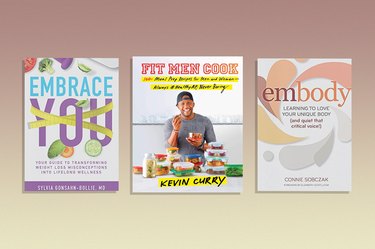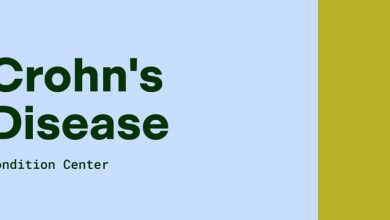The 14 Best Weight-Loss Books to Read in 2024

LIVESTRONG.com Creative
Many people are constantly trying to lose a little weight, and books can be a really helpful resource when you’re looking to trim your waistline. The problem is that a lot of books focus solely on how to lose weight or which diet to try instead of thinking of it as a holistic journey.
Too often, these books focus on weight loss as an aesthetic goal instead of encouraging you to make healthy lifestyle changes that will help you lose weight gradually and really love the body you’re in.
With that in mind, we asked a few experts to recommend the best weight-loss books to read in 2024 that follow the principles of self-love and self-care.
Quick Picks
- ‘Fierce Self-Compassion’ by Kristin Neff: Amazon ($18.29)
- ‘Embody: Learning to Love Your Unique Body’ by Connie Sobczak: Amazon ($16.29)
- ‘The Diet-Free Revolution’ by Alexis Conason: Amazon ($15.95)
- ‘Anti-Inflammatory Diet Meal Prep’ by Ginger Hultin: Amazon ($13.07)
- ‘Fast This Way’ by Dave Asprey: Amazon ($17.63)
- ‘The Plant-Based Weight Loss Solution: A 28-Day Plan and Cookbook to Lose Weight the Healthy Way’ by Marina Savelyeva, RD, and Viktoria Waite, DTR: Amazon ($16.99)
- ‘Glucose Revolution’ by Jess Inchauspe: Amazon ($16.99)
- ‘Feeding the Whole Family’ by Cynthia Lair: Amazon ($20.10)
- ‘Thinsanity’ by Glenn Mackintosh: Amazon ($19.99)
- ‘Anti-Diet’ by Christy Harrison, RD: Amazon ($14)
- ‘Embrace You: Your Guide to Transforming Weight Loss Misconceptions Into Lifelong Wellness’ by Sylvia Gonsahn-Bollie: Amazon ($20)
- ‘Eat What You Love, Love What You Eat’ by Michelle May: Amazon ($19.95)
- ‘Run Fast. Cook Fast. Eat Slow’ by Shalane Flanagan and Elyse Kopecky: Amazon ($15.99)
- ‘Fit Men Cook: 100+ Meal Prep Recipes for Men and Women’ by Kevin Curry: Amazon ($17.71)
How We Chose
We talked to dietitians and weight-loss experts to find the best books to help you lose weight. We picked books based on the following criteria:
- Quality research
- Qualified expert authors
- Diet effectiveness
- Cost
For more information on how we choose and cover products, click here.
Best Body-Positivity Books
1. ‘Fierce Self-Compassion’ by Kristin Neff
“The tagline of the book says it all,” says Cassie Christopher, RD, a body-positive registered dietitian and founder of the Stress Less Weight Mastery. “It’s all about how women can harness kindness to speak up, claim their power and thrive.”
Drawing on a wealth of research and her personal story, Neff’s book shows how gaining control over your weight starts with reclaiming the balance in your life.
“Creating space in your life for the healthy behaviors required [for weight loss] often requires connecting to deeper reasons why and setting firm boundaries,” Christopher says. “Dr. Neff’s work shows us how to use self-compassion to make fierce change in our lives and the world.”
2. ‘Embody: Learning to Love Your Unique Body’ by Connie Sobczak
If you think that critical inner voice telling you that you’re just not good enough is helping your weight-loss journey, you can think again.
This book helps readers quiet that voice by guiding them through five core competencies: reclaiming health, practicing intuitive self-care, cultivating self-love, declaring your own authentic beauty and building community.
Christopher says this is a body-positive book that aligns with the health-at-every-size (HAES) movement.
“It explains in detail why traditional dieting is harmful to physical and mental health and provides a path forward with intuitive self-care,” she says. “I love the reflection exercises at the end of each chapter, giving concrete ways to unlearn unhelpful patterns and beliefs.”
She adds that this is a great pick for anyone who struggles with self-criticism, either of their body or when they fall short from ‘perfect’ health routines.
3. ‘The Diet-Free Revolution’ by Alexis Conason
Written by psychologist and eating disorder specialist Alexis Conason, The Diet-Free Revolution offers a 10-step program that helps readers shed some of the unhealthy notions that our culture has toward dieting and our own bodies.
“The book offers a spectacular introduction to mindfulness and exploring your personal emotional attachments to food,” Girgen says. “Conason shares tactical tools like the hunger scale and actionable activities throughout to help you find balance with food while finding acceptance with yourself.”
Best Books on Science-Backed Diets
4. ‘Anti-Inflammatory Diet Meal Prep’ by Ginger Hultin
Inflammation has been connected to several chronic diseases, and it can also make it harder to lose weight. With that in mind, this book offers 84 easy recipes for a six-week anti-inflammatory meal plan.
“By using Hultin’s simple and quick recipes, you can prepare a week’s worth of anti-inflammatory meals during one weekend prep session,” Christopher says. “Her recipes are a great choice for anyone who wants to balance blood sugar, lower cholesterol or lose weight.”
5. ‘Fast This Way’ by Dave Asprey
“This book is specific to intermittent fasting and includes the most recent research studies on timed eating,” says dietitian Kayla Girgen, RD, founder of Nutrition Untapped. “Asprey does a wonderful job of discussing the physical and emotional benefits of intermittent fasting and becoming comfortable in your own skin. Weight management is a personal journey, and this book emphasizes finding the path that is right for you.”
6. ‘The Plant Based Weight Loss Solution: A 28-Day Plan and Cookbook to Lose Weight the Healthy Way’ by Marina Savelyeva, RD, and Viktoria Waite, DTR
There are many benefits to following a plant-based diet (or eating less meat, in general), including a reduced risk of heart disease, high blood pressure, high cholesterol and obesity, per the American Heart Association.
If you want to reap these benefits, but don’t know how to get started, try out this book’s 28-day plan (with more than 75 recipes) by registered dietitian Marina Savelyeva and food manufacturing expert Viktoria Waite.
Each recipe comes with portion suggestions and easy-to-follow instructions, making it great for those just diving into plant-based eating and weight-loss plans. It even mentions ways to incorporate leftovers so you don’t waste any food.
Best for People With PCOS
7. ‘Glucose Revolution’ by Jess Inchauspe
“The Glucose Goddess, Jess Inchauspe, delivers a practical handbook for balancing blood sugar and insulin, pivotal to PCOS management,” Girgen says. “With illustrations to drive home central concepts, you’ll develop a deeper understanding of blood sugar regulation and learn 10 hacks for taming your glucose spikes.”
Managing your blood sugar may help you manage PCOS symptoms and weight gain.
Best Family-Focused Book
8. ‘Feeding the Whole Family’ by Cynthia Lair
Losing weight on your own is hard enough. When you’re in charge of the cooking and have a family to feed, that presents a whole other challenge.
Luckily, this iconic cookbook offers tips and recipes that will get the entire family on board with healthy eating — yes, including the kids.
“Lair explains the benefits of whole foods, how to prepare them and what foods to incorporate for maximum nutrition,” Christopher says. “I have personally cooked almost every recipe in this book and I can testify that they are all healthy winners. She includes an entire section on kid-specific topics like how to help your kids become healthy eaters and how to introduce solids to children, plus each recipe has slight modifications for babies and toddlers.”
Best Psychology-Based Book
9. ‘Thinsanity’ by Glenn Mackintosh
“Mackintosh is a psychologist specializing in body image and weight management,” Girgen says. “Thinsanity breaks down diet culture along with social and medical ‘norms’ such as BMI and our longing pursuit of ‘thinness.’ He offers deep dives into personal reflection and how a person views themself.”
This book includes several activities to help encourage a positive body image and combat the art of comparison.
10. ‘Anti-Diet’ by Christy Harrison, RD
Sometimes to lose weight, you need the exact opposite of a diet — i.e., an anti-diet. In this book, registered dietitian Christy Harrison outlines the ways that obsessing over your food choices can actually be harmful for your long-term health. She deep dives into diet culture and how it affects us mentally.
Harrison also outlines how eating intuitively (that is, eating nutritious foods when you’re hungry and enjoying all foods in moderation) could actually help you lose weight and settle into what’s healthiest for you.
Best Books With Personal Testimonies
11. ‘Embrace You: Your Guide to Transforming Weight Loss Misconceptions Into Lifelong Wellness’ by Sylvia Gonsahn-Bollie
Author Sylvia Gonsahn-Bollie, MD, is a dual board-certified internal medicine physician and obesity medicine specialist. She’s also struggled with weight loss herself. After finally developing a plan that helped her lose 40 pounds in one year, she decided to write a book to help others achieve their own weight-loss goals.
“This guide leads you on a journey to release old restrictive tools in weight loss such as generalized body mass index (BMI) charts, crash diets and ‘all or none’ mindsets,” Dr. Gonsahn-Bollie writes. “Instead, the reader thoughtfully embraces your healthy weight, your happy weight, your sleep and mindset tools on your positive individualized weight and wellness journey so you can stop obsessing over the scale and other’s standards.”
12. ‘Eat What You Love, Love What You Eat’ by Michelle May
“This is hands down the number-one book I recommend to patients,” Girgen says. “First of all, Dr. May has walked the walk, and being that she has struggled with managing her own weight, this book is extremely relatable.”
Michelle May, MD, is a self-described “recovered yo-yo dieter” and the founder of Am I Hungry? Mindful Eating Programs and Training. Drawing from her own personal experiences, she helps readers resolve the struggles they’ve had with crash diets in favor of a more mindful approach to food.
“I often hear from patients that they connect to the book,” Girgen says. “This book offers a number of actionable steps to help avoid ‘dieting’ and start eating intuitively in a way that helps you achieve your health goals for the long haul.”
Best Books for Your Fitness Goals
13. ‘Run Fast, Cook Fast, Eat Slow’ by Shalane Flanagan and Elyse Kopecky
Whether you’re a beginner just starting your fitness journey or a seasoned athlete, the tips and recipes in this book could help you stick with your nutrition goals, to help you perform your best.
While this isn’t necessarily a diet book, it offers great advice for fueling your workouts, which could help toward your weight-loss efforts. It doesn’t include nutrition information (as the authors want readers to focus on fueling with nutrient-dense foods), but it is reviewed by dietitians.
Plus, it’s loved by many: It has more than 2,500 nearly five-star reviews on Amazon.
14. ‘Fit Men Cook: 100+ Meal Prep Recipes for Men and Women
Another fitness-oriented book, this one by personal trainer and fitness influencer Kevin Curry will give you all the motivation to meal prep balanced, nutritious meals that will fuel your workouts.
Most recipes take 40 minutes or less, include nutrition information (which is helpful if you’re into counting calories or macros) and incorporate ways to swap out certain ingredients to make it more customized to your wants/needs.
How to Choose the Right Book for You
Ultimately, only you can decide which weight-loss approach is best for you, and it’s likely that you’ll feel it in your gut when you’ve found the right one. But here are some things to keep in mind when choosing a safe, sustainable weight-loss book, according to Christopher:
Red Flags to Look Out For
1. Overly restrictive advice: Cutting out entire food groups, for example. “Besides missing out on important nutrients, if you can’t easily go on vacation and follow the plan, you won’t be able to stick to it for the long-term,” she says.
2. All-or-nothing language: She also advises against books that don’t include the kind of food that you like, or ones that include all-or-nothing language, like “cheat days.”
“Long-term sustainability means learning to be satisfied and use moderate indulgence all the time rather than skipping between restrictive diets and binging,” Christopher says.
Signs a Book Might Be a Good Fit
1. Evidence-based: “The Mediterranean diet, MIND diet and DASH diet are specific dietary patterns that are based on good science for health promotion, and are not too complicated,” Christopher says.
2. Body-positive: She also advises sticking to books that have body-positive language and allow you to accept yourself and be kind to yourself even as you make changes.
3. Food-forward: Finally, “make sure the authors seem to enjoy food,” Christopher says. “If you feel like you could go out to dinner with the author and eat well and have fun, that’s a good indication that their advice will fit well in your lifestyle.”



